#Mha Critical
Explore tagged Tumblr posts
Note
So I was looking around the bnha subreddit and found a forum asking who everyone's least favorite hero (besides endeavor because that would be too obvious). One comment talked about how uwabami wasted momo and itsukas potential, and one of the replies said this about momo:
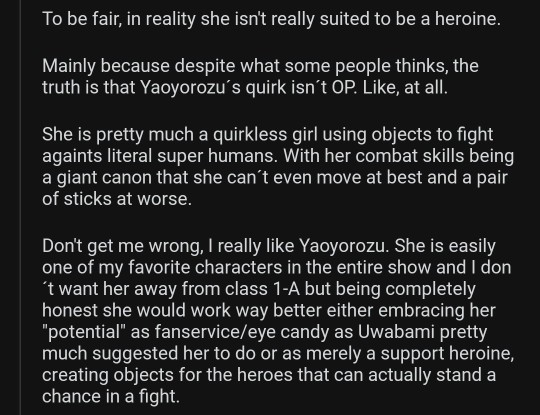
live suchusoid reaction:

I'd tear this argument down myself, but I'm to tired and hungry, so I was wondering what your thoughts on this were.
Ugghhhh, it's 1 AM. I was gonna leave the rest of my asks for a more motivated me.
This has, officially, motivated me. For this ask specifically, the rest of y'all will have to wait.
So!
Momo's quirk is insanely powerful. Her quirk is creating objects out of her lipids, though the measure is never really clear.
She isn't even fazed by creating a canon. Which! By the way! A canon is roughly 600kg. Six. Hundred.
That is over 10 times her weight. And that isn't even the limit.
All we know is that she cannot create living organisms, but it's also not clear if this includes things such as bacteria. Because it's unclear, I'll only look at inanimate objects.
Momo is literally only held back by her creativity, and thus Horikoshi's creativity.
She's insanely powerful and versatile.
Oh, the villain has a fire quirk? Time to make a fite extinguisher!
Oh, the villain has a wood-based quirk? Time to make a flamethrower!
Oh, a civillian is bleeding out? Time to create a medkit!
Oh, someone's drowning? Time to make an oxygen tank!
Her quirk is only limited by what she knows and her ability to think on the fly. That is all. Because there is no known limit to how much she can make.
It isn't that her quirk isn't OP, it's that Horikoshi didn't allow Momo to use her quirk to her full capacity.
Like, against Tokoyami, she could have easily created flashbombs to weaken him, or a flamethrower to keep a consistent amount of light.
She could destroy Bakugou simply by creating gunpowder and throwing it at him - he'd blow himself up. Or making a hose and spraying him.
Most of all: she could make a gun. Like, it's so weird that so many mangakas forget that guns exist, because so many people in MHA could be beaten by a gun.
Momo has the ability to create anything she needs to beat her opponent. It's literally just her ability to adapt and her (or Horikoshi's) creativity.
Fucking– LOOK AT FULLMETAL ALCHEMIST!
Ed is far more limited in his alchemy than Momo is with her quirk, in that he can only transmute things if the cost is equivalent. But he's still far more creative than Momo is in the use of his abilities.
Heck, even Senkuu from Dr. Stone has more creativity than Momo, and he doesn't have any supernatural abilities.
Momo's quirk is OP, and she would be awful as plain fanservice.
I'm not against fanservice. Heck, I love both One Piece and Fairy Tail - fan service is not unwelcome. But, fan service should be done in moderation and some series just don't need it. Also, the context does matter.
Bringing up FMA again, the only fan service we get is from Lust who, shocker, is the personification of lust. Her entire being is lustful, so it makes complete sense for her to be fan service. But she also serves other purposes, and doesn't exist solely for fan service.
In MHA, it's fine to include fan service if it has a point.
Mount Lady is introduced via fan service to show how female heroines have to act in order to gain fame. Uwabami emphasises this, as does Midnight.
However, a theme that was (attempted to be) shown was 'Old vs New Generation'. All those heroines showcasing their fan service were part of the older generation, and the new one was supposed to change the status quo.
Momo and Kendou were both shown to be disgruntled at the idea of using their sexuality to gain fame, and were far more focused on actually becoming heroes and bettering their abilities.
To say that Momo should have only existed for fan service is completely missing the point and invalidating her character.
If anything, she should have been able to show skin without it being sexualised. In the same way male fan service was used to show strength, Momo (and other female characters) should have had fan service to show their strength, rather than being sexualised.
People like the person in that image frustrate me, because they have no idea what they're talking about.
"At best, a canon that doesn't move," NO!
At best, a fucking hydrogen bomb. She could create nuclear weapons. She could do so much, it's Horikoshi who limits her.
#ask#mha#bnha#boku no hero academia#my hero academia#mha critical#bnha critical#kinda#horikoshi critical#momo yaoyorozu#yaoyorozu momo
35 notes
·
View notes
Note
What do you think of Tsuyu for the bingo ask?

I really like her and I am currently making a long post about her but I am not sure when it will come out.
I was kind of dissspaointed with the lack of a character arc she ended up getting especially because there is so much you can do with her character whether that be focusing on her duties as an older sister or including her in the hetamorphis discrimination plot line.
And don't get me started on how cool her moments in the beginning of the series used to be!!! Horikoshi presented her as a very unapologetic blunt character that will say what's on her mind and calls people out when needed (she did it multiple times with bakugo) such a shame we lost that part of her.
Also, I love the hero name froppy so much!!



#mha#bnha#mha critical#thanks for the ask#thanks for the ask!#bhna critical#froppy#tsuyu asui#tsuyu asui deserved better#mha asui
17 notes
·
View notes
Text
i don't like the growing opinion that people are being 'too hard' on deku for his failing to save shigaraki.
i've seen quite a few people complaining that a lot of the bnha-critical crowd are being too mean to deku for getting tomura killed, arguing that it isn't really his fault, and that hes a 16 year old child soldier who's been failed by almost every adult in his life, why should we be putting all of this on his shoulders? hes just a kid after all?
and the truth is, they're right. deku IS a 16 year old boy whos had the fate of the world thrust on his shoulders. but the story itself just plainly refuses to acknowledge this.
the narrative doesn't acknowledge how fucked up having a school that trains literal children how to be combo cop-celebrities is. it only tentatively acknowledges the fact that a universe having combo cop-celebrities is fucked up, and even then the only people who ever point this out are antagonists, who are portrayed and treated in-universe as untrustworthy. the narrative doesn't care how fucked up dekus circumstances are. the narrative treats deku like hes a fucking messiah here to touch the hearts of the evil depressed villains with his magical empathetic heart of gold before they get blown up or just sent to fucking superhell for daring to challenge the status quote.
deku isn't a person. he's barely even a fucking character at this point. he's a plot device, and a mouth piece for the objectively shitty themes bnha is trying to spout. the themes that tell you that if you're mistreated by society and want to do something about it, you're a villain. that disrupting the status quote and refusing to repent to some random teenage boy spouting empty platitudes at you means you deserve to get sent to fucking superhell. the themes that portray people fighting for civil change as mass murdering supervillains. the themes that look the audience dead in the eye and can call deku the greatest hero to ever live.
deku, who barely spared a second thought to lady nagant telling him the truth about the hero commission. who spouts meaningless platitudes about heroism and morality at nagant, and aoyama, and toga and shigaraki, when even the thought that he should question the world around him comes up. who's constantly talked about as this truly kind, empathetic person, but hasn't spared an empathetic thought to literally anyone who is classified as a villain. who listened to every authority figure around him except the ones who asked him to question his worldview. who saw la bravas tears, shigarakis various breakdowns, himikos plead for understanding, chisakis catatonic state, lady nagants truth, and barley batted a fucking eye. deku, who killed tomura shigaraki.
people don't criticize deku for failing shigaraki because they just hate deku. people criticize deku because of what he represents. because hes a mouthpiece for the atrocious morals and themes of this ideologically rotten manga. because any character he had was chopped up to bits in favor of the incomplete husk we have now. people criticize deku because hes the main character of my hero academia. theres nothing more damning then that.
#my post#bnha#bnha critical#izuku midoriya#midoriya izuku#sorry if this sounds really angry. i mean i am very angry at bnha for being such a nothing burger of empty platitudes and wasted potential#but like. that was extremely predictable#bnha wanted to be more than it was willing to put effort into being and so now its just. worthless#so this is just kinda a vent on all my angry feelings abt dekus failure as a character and a protagonist#tomura shigaraki#my hero academia#boku no hero academia#mha critical#my hero acedamia critical#boku no hero acedamia critical#deku#bnha meta#i mean techinally#mha#mha meta#bnha manga spoilers#bnha manga#long post#well longish
1K notes
·
View notes
Text
It always bothers me when fans mock or make fun of critics/antis for constantly making posts venting their grievances about a story they dislike and say shit like “oooh why can’t u just talk about something u like11” or “pfft, get a life and do something more productive than complaining about a show!” and plenty of other shit.
Not only does this come across as condescending, it’s also hypocritical. So if people aren’t allowed to make posts about things they don’t like…I guess that means that fans can’t make posts about things they do like. I throw these same arguments fans use against people who complain about something that’s enjoyed by a good amount of people. “OMG why do you care so much about a stupid show” and shit like that.
Fans like these don’t realize that the reason for why people talk about things they don’t like is the same reason for why people talk about things they do like; they are passionate about it and enjoy analyzing it. They like breaking it down because they just enjoy media analysis. It’s not unhealthy, it’s not obsessive, it’s just a perfectly normal way of consuming media. And critical communities on Tumblr allow for a safe space for people to voice their grievances about a piece of work without being harassed by deranged stans.
My point is; let people make blogs criticizing shows whenever the fuck they want. What they are doing is no different than what fans of the work are doing; analyzing the story and voicing their opinions.
#vivziepop critical#hazbin hotel critical#vivziepop criticism#helluva boss critical#toh critical#mha critical#spop critical#arcane critical
330 notes
·
View notes
Text









my growing collection from redacted dot com 🥲
#seriously this shit sucks so much ass#i just can’t believe a series i loved so much that brought me so much joy is wrapping up in the way it is#truuuuuly my fumble academia#maybe i’ll try to write out more thoughts about it at some point but for now it’s just sooo disappointed#like amazingly so#bnha#mha#bnha critical#anti mha#anti bnha#mha critical#shigaraki tomura#tomura shigaraki#tenko shimura#shimura tenko#my stuff#bnha manga spoilers
636 notes
·
View notes
Text
i was never as optimistic about the ending of bnha as some villain stans were, but i never thought it'd end so badly it left me wondering why horikoshi ever bothered to humanize the villains or make them complex characters at all.
like-- i expected that at least 1-2 of the 3 villains who were heavily foreshadowed and outlined by the narrative as people to be saved would be, you know, actually saved. i didn't think that was a high bar. i've been let down before in fandoms where everyone was certain a character would live and then they didn't, so i tried to keep my hopes low. AND YET.
what happened to tomura was upsetting, but i wasn't that shocked after how disinterested the manga has seemed to be in him for like, the past 100 or so chapters. a bit surprised, because you'd think if anyone would succeed in the 'saving' mission it would be the MC, but whatever. dabi, well, they've spent a lot of time showing the way his quirk destroys his body even before this arc, so that also sucked but at least it didn't feel completely out of left field.
........but they're not even letting toga live???
i just-- what have we even been doing here? when zero out of the 3 characters that were marked out for saving were actually saved, you have to acknowledge that something has gone seriously fucking wrong with the storytelling. not even just from the perspective of a villain fan but from the perspective of someone who likes stories to be thematically consistent or satisfying in any way.
you can set up an expectation of these characters being saved and then subvert that and turn it into a tragedy- if done well that could even be worthwhile and interesting. but you can't turn it into a tragedy and then just... keep trucking along with the happy ending messaging and act like anything in the manga has been resolved and that the characters have somehow successfully completed their heroic origin stories.
like, maybe i shouldn't have expected this much from a shounen- at the end of the day it is still a shounen so i didn't expect to feel that it truly satisfactorily wrapped up all the themes it brought up around societal ills. but i expected it to at least resolve those things in a shounen-y way where they punch the problems and help these specific people and then you can feel good assuming that the state of things will continue to improve in the post-canon world of the manga.
instead we got... uh, none of that. the story refused to answer a single one of the larger questions it's been outlining for the past 400+ chapters. in the end, it was all flash and no substance, which again could've been fine, if it weren't for the way the story seemed to spend significant chunks of time trying to delude you into thinking it had substance.
truly makes me wonder what horikoshi thought he was doing the entire time. can it really all be blamed on burnout? the most that can be said for this ending is that it is, well, an ending. fuck dude, it is that.
and that's just... such a sad way to end a project that took up 10 years of your life.
#bnha critical#mha critical#bnha leaks#bnha spoilers#bnha 429#made a post like this earlier on main and then deleted it btw#in case you are one of like 3 people who could potentially recognize the repeated lines#Or maybe the questions do have answers they're just answers that i hate? But that's the part that leaves me wondering#Why spend so much time humanizing the villains in the first place if you were going to go that route???#Truly i don't get it.#bnha#ok i know dabi isn't technically dead yet but there's still another chapter left for horikoshi to finish nailing that coffin 🤪
608 notes
·
View notes
Text
JASON TODD VS. DABI: WHY NOT ME?
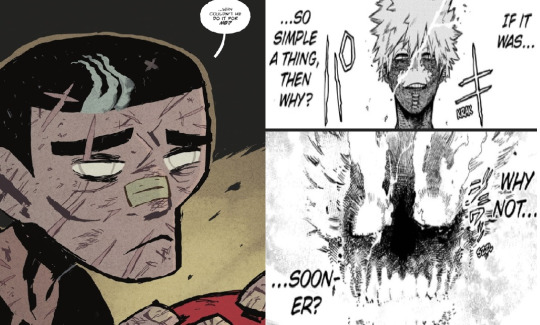
"You haven't been here long but you've seen him, right? The batman. The batman. He lives in darkness, to find the helpless and bring them into the light. So I have to wonder...why couldn't he do it for me?" The Boy Wonder: Issue #2
This is the story of the boy who didn't get saved. The story of a boy who really ought to have been saved. Of course, every victim deserves to be saved, but this boy was the son of a superhero. Can a hero who saves everyone, but fails to save his own son really be called a hero? As for the son, how does it feel to watch his father save complete strangers but let him fall to the wayside?
Jason Todd and Dabi are two characters with similar backstories and motives (so similar it's possible Dabi is outright based on Jason Todd) which are worthy of comparison. These are two tragic arcs which explore the conflict between a hero's responsibility to act as a father, and their responsibility to save people. As I said they are tragic because in both cases the hero fails, as a father, and a hero. However, I'm comparing the two because Jason Todd's story is a well written tragedy, and Toya's story is not.
If you were to write a story of my life, it would surely be a tragedy.
Aristotle's Poetics is the first attempt to define what Tragedy is, not as a story where sad things happen but a specific story structure. He outlines not only what makes tragedy, tragedy, but also what makes a good tragedy.
The Plot, then, is the first principle, and, as it were, the soul of a tragedy: Character holds the second place. A similar fact is seen in painting. The most beautiful colours, laid on confusedly, will not give as much pleasure as the chalk outline of a portrait. Thus Tragedy is the imitation of an action, and of the agents mainly with a view to the action.
I use this quote because the painting metaphor is a great way of explaining what I'm getting at, you can have a painting with the most wonderful colors, you can have a story with really good ideas like the Todoroki family plotline but if you don't use those colors correctly all you're going to end up with is a bad painting.
In poetics Aristotle clearly defines a tight well-structured plot as the first priority for effective tragedy, character as second.
Again, a beautiful object, whether it be a living organism or any whole composed of parts, must not only have an orderly arrangement of parts, but must also be of a certain magnitude; for beauty depends on magnitude and order. Hence a very small animal organism cannot be beautiful; for the view of it is confused, the object being seen in an almost imperceptible moment of time. Nor, again, can one of vast size be beautiful; for as the eye cannot take it all in at once, the unity and sense of the whole is lost for the spectator; as for instance if there were one a thousand miles long
To make sure you understand, it's vital in tragedy for all the pieces to fit together. Tragedy is a specific story format. Good tragedy uses the parts of a story well, but bad tragedy is sloppy and poorly put together. In tragedy, the whole has to be greater than the sum of its parts. The Todoroki Family are all good characters out of context, but the story could have enhanced their characters but detracted from them due to how poorly it is told. The fact that a lot of MHA fans are in love with the Todoroki family out of the context of the story, but also have constant complaints for how Horikoshi handles their plotlines is, in my opinion, very telling.
What Aristotle goes on to posit is the best tragedies do not come about by accident, but rather by the direct actions of the characters.
But again, Tragedy is an imitation not only of a complete action, but of events inspiring fear or pity. Such an effect is best produced when the events come on us by surprise; and the effect is heightened when, at the same time, they follow as cause and effect. The tragic wonder will thee be greater than if they happened of themselves or by accident; for even coincidences are most striking when they have an air of design.
Therefore Tragedies require consequentialism, like Newton's Third Law, every action will have an equal and opposite reaction. To simplify a good tragedy arises from the consequences of the character's actions (or inaction). The most basic form is that the hero of the story will have a tragic flaw that they fail to improve upon in time and then leads to their destruction. In essence, tragedy is where the hero fails. Not only does the hero fail, but the hero loses, and that irreversible loss is what defines tragedy. Medea slays her own children, Oedipus rips his own eyes off and deserts his kingdom, Creon Antigone is buried alive and Creon's son, her fiancee, commits suicide.
These events share two things in common, they are irreversible (hence why they feel like good endings), and two they evoke catharsis. Aristotle defines the goal of tragedy to evoke terror and pity. We feel alongside these heroes, Medea was abandoned by the husband Jason who she left her home and slaughtered her own brother for, Oedipus did all of his crimes unwittingly and is a victim of fate, Antigone was doing the right thing by burying her brother so his soul could pass on to the afterlife.
There's all different sorts of tragedies, Hamliet explores more here. I'd say UTRH and Hellish Todoroki Family are tragedies centered around grief.
Tragedy works on extreme emotions, and extreme hard-hitting consequences to the hero's failures. The worst thing a tragedy can be is boring.
The Tragic Hero
Now that I'm done lecturing you let's actually talk about both My Hero Academia and Batman like I promised. Both of these stories don't actually feature the central victim as their protagonist, and that is a feature not a flaw.
Rather, the story we are being told is that of a tragic hero, failing to save a tragic victim because of their own personal flaws.
These flaws are called (hamartia) or "error in judgement". A hero, being called a hero of a story is often unaware of his flaws which is central to what makes them unable to fix those flaws in time. That flaw can later lead to a moral failing, such as Othello's jealousy, initially jealousy is an understandable emotion, but then it leads to him trusting Iago over his own wife and killing his wife in a rage.
Most importantly, the hero’s suffering and its far-reaching reverberations are far out of proportion to his flaw.
Let's begin with talking of the heroes and their flaws, Batman and Endeavor. My main reason for comparing these two is in these specific stories they have the same flaw, inability to move past their personal guilt towards their son, and the same conflict the duty of a father versus the duty of a hero.
However, Batman functions as a tragic hero, and Enji does not. The summary of their conflict is right here in these two panels.
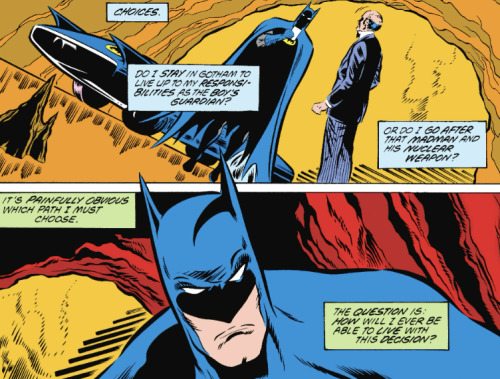
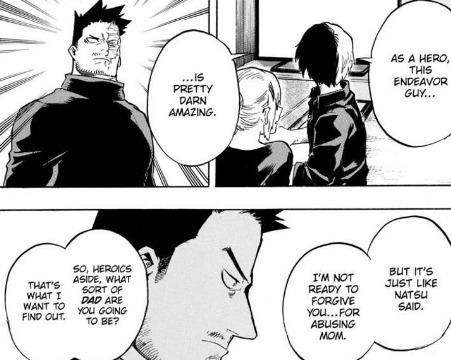
A parent is required to place their children above everything else, because they are the ones responsible for bringing that child into the world. Bruce Wayne made the decision to adopt Jason. Enji made the decision to have children, however with Enji you have the added insidious motivation of he only wanted to make designer babies and just didn't care for the ones who didn't turn out right.
Bruce attempts to do both, to act as a father for Jason and also a crime fighter as batman but he can't do both. This comes to a head in Death of the Family when Jason is having serious trouble because of his lack of a strong parental figure, and Bruce knowing that Jason is in trouble chooses still to go off and fight crime instead of staying with him. The choice to place crimefighting over the child they chose to take responsibility for has the unintended consequence of getting that child killed.
Whereas Enji makes the same choice over and over again, ignoring Toya's clear troubles at the fact his father no longer spends time with him and choosing to run away to the world of heroes because he doesn't want to face the fact that his actions are severely hurting his son. Bruce's motivations are more sympathetic admittedly he wasn't actively practicing eugenics, but the choice is the same and the consequences are the same.
Both Bruce and Enji are forced to bear witness to the deaths of their children when they are not there, specifically because they made a choice to be a hero instead of staying by their child's side. A situation directly caused by their choice to be a hero over a father, and a situation that would have been avoided if they had stayed with their child in their time of need. Jason runs off when Batman tells him to stay and gets kidnapped by the Joker, if Enji had been on Sekoto peak that day Toya would never have accidentally lost control of his fire.
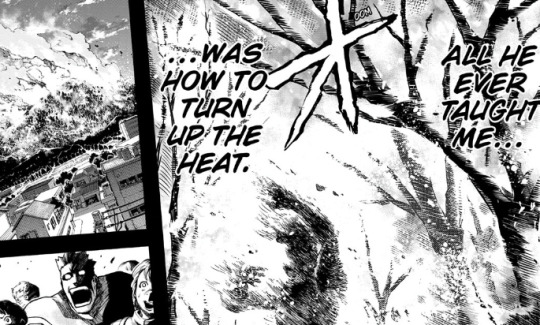
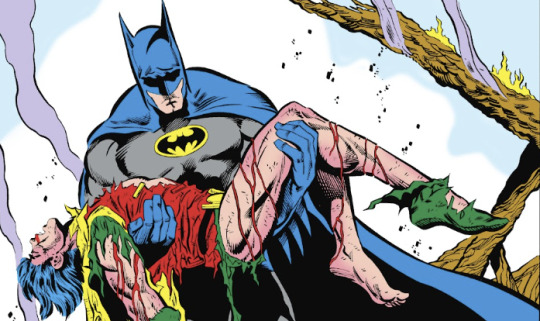
This is just the backstory however, the main event that kickstart this plot is the unexpected return from the dead of both Jason and Dabi. Each story follows the same plot beats. A new villain appears to challenge Endeavor / Batman. The villain reveals themselves as their dead son. Both Endeavor / Batman are given a chance to try reaching out to their sons, but they choose not to.
Then even though they are given a second chance with a miracle of a dead son coming back to them, they choose the exact same thing they chose before, being a hero and because of that the tragedy repeats itself. For both of them they are unable to save their son again, and the son goes through a second death. History repeats itself, the lesson isn't learned.
Their fatal flaw is their guilt. This is a story about grief and mourning after all, a son who is died, buried, but never grieved properly, never mourned, an open wound on the father suddenly coming back. The inability of each to process their grief blinds them from seeing the fact the son has come back, and they have a second chance.
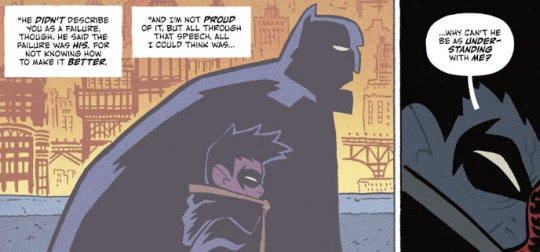
Toya has internalized he is a failure, because Enji literally called him that. Jason believes that Batman thinks he is a failure. In both cases the father is the one who failed, Bruce at least acknowledges this but cannot communicate it in any way shape or form.
This guilt and responsibility both Enji and Bruce feel causes them to self-sabotage. They no longer have the confidence they are in the right (they no longer feel like heroes because they have failed to be heroes to their own son).
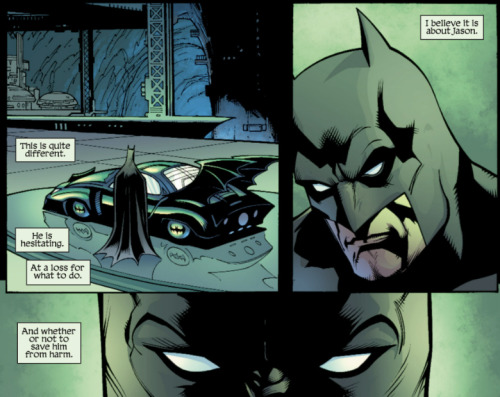
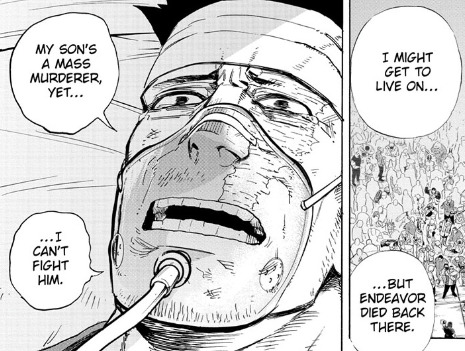
You can also add the layer of complication that since both men chose to be heroes in the past, they do not know how to handle the situation as a father now that they're being challenged to step up as one. Unfortunately, they are not the fathers that stepped up.
The reason their grief becomes a flaw is because they put their grief over their victims. . Each man is aware too much of their own failure, and while they should feel guilty they make the classic mistake of placing their own guilt over the feelings of the victim. The guilt they feel for causing the death and the genuine grief of losing a son is given priority over Jason and Dabi who you know... actually died.
An overwhelming grief and guilt is understandable because grief is a messy and human emotion, losing a child is an unimaginable tragedy that should never be inflicted on anyone.
Yet at the same time both Dabi and Jason are grieving to. This paradox that Batman only thinks of his own grief at losing a son and never stops to think about how Jason must feel leads to one of the best lines in Under the Red Hood.
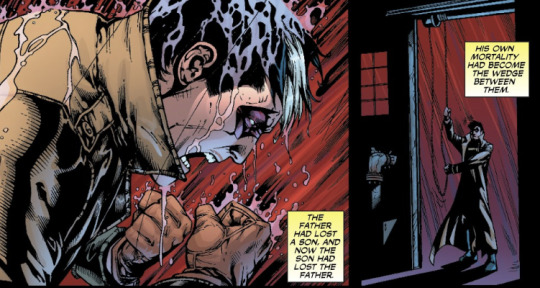
"The father had lost a son, and now the son had lost a father."
Batman's guilt is so strong over being the cause of Jason's suffering, that the suffering of the victim himself is ignored. To be fair to My Hero Academia, the Todorokis say a similar line to Enji.
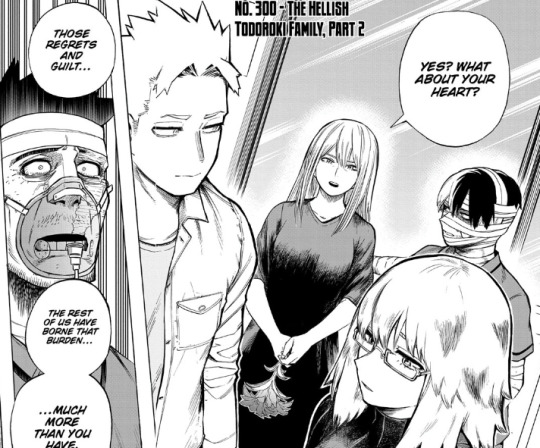
However, this is where I begin to get into the difference between ideas and execution. Tragedies are stories of actions and logical consequences, every action has an equal and opposite reaction in Under the Red Hood. Batman is punished for the choices he makes, the choices he doesn't make, and the choices he fails to make in time.
The Todoroki plotline features almost none of its character making any choices of substance, and because of that the plotline says the right things over and over again, but it all comes off as tell don't show.
I'm going to quote @codenamesazanka's post right here a couple of times because they describe the complete failure of the Todoroki plotline to show us a reason why we should be feeling things for the characters artfully.
We've heard Enji say this before - I'm sorry, I intend to atone. It's indeed the right thing to say, it's exactly what he should be saying and acting. Natsuo is declaring no contact - That's fine, I'm sorry, I accept this as part of my atonement and will continue. Touya calls him a coward - That's fine, I'm sorry, I accept this as part of my atonement and will continue. The public hates him - That's fine, I'm sorry, I accept this as part of my atonement and will continue. But you can only hear this so many times before you want to snap and beat the character, the story, the writing over the head with Enji's wheelchair. Why is that? He's behaving exactly as he should, and yet...
The reason why it fails to evoke strong feelings is because of what we'd called "narrative dissonance." The actions of Bruce and Enji are the same, they both neglect to do anything, make any real attempts to reach out to their victims because they're paralyzed by guilt.
However, we are told that they have entirely different arcs. Bruce's arc is a tragic fall. He's failing as a hero. While we are being told that Enji is experiencing an arc of atonement. Enji is supposed to be improving himself, and Bruce is supposed to be experiencing negative character development but they both do the exact same thing in story. Bruce neglects Jason, we are told by the story, by the characters in the story that Bruce is failing Jason. Enji does nothing in time to actually atone for Toya or try to help him, yet, we are told again, and again, and again, and again, and again, and again that Enji is atoning with nothing substantive to show us this is the case.
To show what I meant instead of telling this scene is in chapter 252.
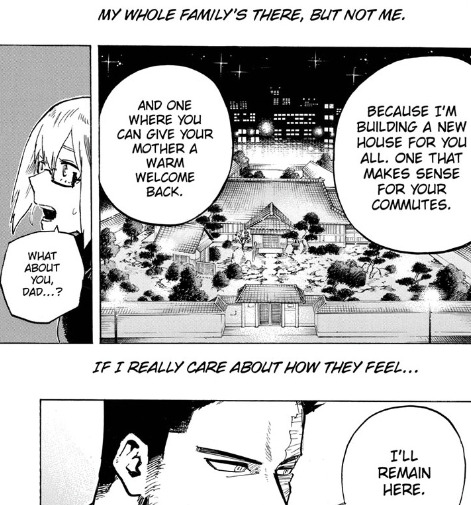
This scene is the ending point in chapter in chapter #426.
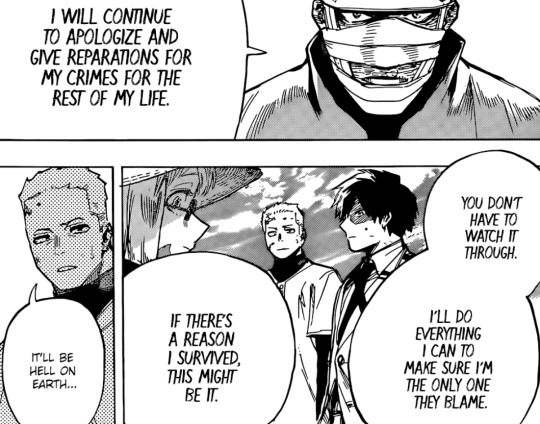
It's just him repeating the exact same sentiment and yet in a more than 150+ chapter gap, Enji never made any action to show he was now placing his family first. Enji didn't say anything to Dabi when he revealed himself as Toya. Enji didn't look for Toya in the months before the final war arc. Enji literally appeared on live TV in a broadcast that Toya was watching and said the very selfish "Watch Me" atone for the crime of creating Toya instead of literally talking about Toya or too Toya. Well, that would have rocked the boat too much... THAT IS LITERALLY THE POINT. Enji had to somehow break from tradition or make some significant sacrifice onscreen to his social standing to show that he's willing to put his family first. Enji decides to go along with Hawks decision to not face Toya head on, making the decision to be the hero for the final time which directly causes Toya to get up after Shoto brings him down non-lethally and make one last attempt to suicide bomb for his father's inaction.
Bruce does nothing for a long time in Under the Red Hood. He ignores his initial instinct that Jason came back and instead makes a long investigation on whether or not someone can come back from the dead in order to distract himself. When Jason takes the mask off, Batman already knew but was pretending otherwise because he didn't want to face the reality.
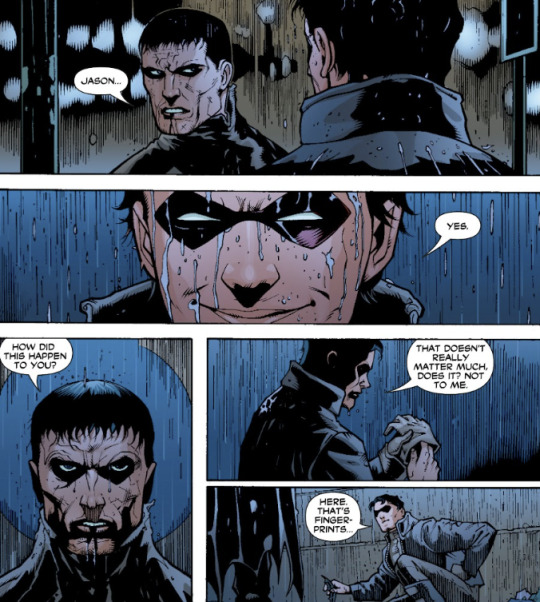
Even when Jason takes his mask off, Bruce still takes on the "I need to investigate this" angle even though Jason calls him out that deep down he already knows it's the truth. This of course foreshadows Bruce's underlying flaw, he doesn't want to face Jason head on because he feels too much grief about what happened to Jason and his guilt is more important than Jason's own grief. Just as the father has lost the son, the son has lost the father.
What follows is several chapters of Batman fighting crime as usual and making no attempts to directly search for Jason. They cross paths a few times but when they do Bruce doesn't follow. In fact, Bruce only shows up when Jason sends Bruce a sample of the joker's hair and Bruce knows that the Joker has kidnapped him out of Arkham. Bruce almost lets Jason get killed by Black Mask because he doesn't know whether to stop Jason or save him yet again, and then they have their final showdown where Jason has kidnapped the joker to demand Bruce kill him, and Bruce finally attempts to talk him down.
Out of context it sounds like I'm describing the same plotline, to the point where if you haven't read either, it looks like I'm complaining baselessly. Why is one hero doing nothing until it's too late good, and the other bad? The difference is of course context, or rather framing. Bruce's actions are called out by the people around him (Dick, Jason, Alfred) as him handling the situation wrong. Whereas both Enji's internal monologue and other characters say that he is doing his best to atone for his actions and deserves a chance, but the events we are shown in story are the exact opposite.
Here's another example to SHOW my point. Here's Dabi with my special, hardcover edition of under the Red Hood.
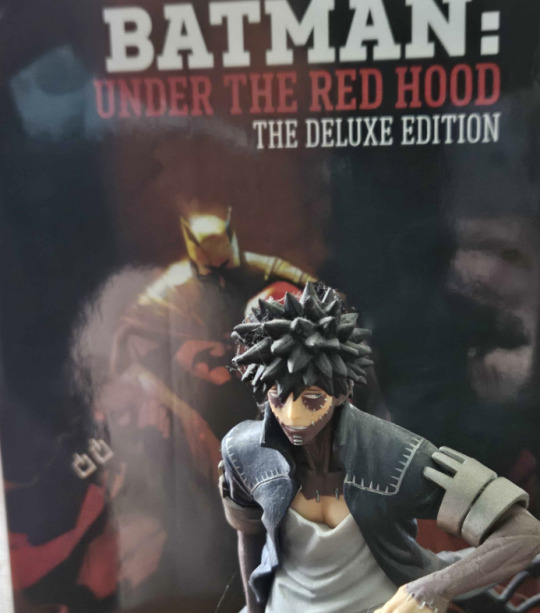
I reread the entirety of the fourteen chapter plotline and the majority of internal narrations come from characters outside of Bruce observing his behavior and commenting on how differently he's acting. Jason's backstory for instance is told by Alfred, not Bruce. Dick Grayson the first Robin comments on Batman's odd behavior. The rest are the third person narrator. Bruce has four instances of internal monologues spanning a few pages each in a 378 page story. (Alfred has the most internal monologues and he's presented as a more trustworthy unbiased narrator than Bruce, to get us to question Bruce's actions).
"Information travels on many routes, sometimes it comes predictably like the tides. You just need to know where to stand and meet it. Other times it's elusive and you have to root through the garbage to find it. In the last few years I've come to rely on Barbara Gordon, Oracle, we all did. Utilizing every form of surveillance equipment she has been the eyes and ear [...] but those days are over. I can't rely on anyone anymore. [...] and tonight it's also about the company I keep. It's different with him [night wing] out here. I think about when he was younger, when I was younger, it was different, simpler and I miss it. I miss those days, for that it's hard to be around him.
This first internal monologue is a case of unreliable narrator, because as soon as finishing it Dick Grayson / Nightwing shows up, offers Batman his help and while Bruce at first refuses it the two of them are forced to work together to fight Amazo. What does this show us? Bruce is not alone, but Bruce actively acts like he's alone ignoring the feelings of the other people around him. It exhibits a flaw of Bruce and the bad headspace he is in mentally (if I remember correctly Stephanie Brown recently died in the comics while this storyline was being published. It establishes Bruce's improper coping mechanism with grief, and how he is going about it the incorrect way.
Bruce says I work alone, and then Bruce says it's easier working with Dick, I miss it, but I can't go back to those days. It's bruce's contradictory thinking patterns in the same chapter that stop him. it's bruce's fault he cannot connect to Dick, and he is actively mourning the past because his relationship with Dick has changed.
Now the final part of the monologue in that chapter.
He's quick. Not just fast, agile. He's not thinking about his next move, he's just making it. He's been trained well. And there's something about him. Something familiar. There was something interesting about before he cut the line, before it had been taught. That had to have been practiced. Either that or just plain dumb luck. No it's not luck.
This is the first hint that Bruce already suspects it's Jason from early on but is in denial about it. This unreliable narrator trope also gives an agency to Bruce's decision, he is actively choosing to ignore the possibility that it's Jason because it doesn't want it to be.
Whereas, a lot of Endeavor's plot takes away any agency from him. For example, he doesn't even know that Dabi is Toya, because if he had the sneaking suspicion and ignored it like Batman did that might have made him look bad. We can't have the main character in a tragedy looking bad now can we?
The second monologue is more denial.
That device is from Kord industries. I should know. Ordered it special from them. How can he have it? No more dead ends. No more questions. No more guessing. Tonight I find out what is passing for the truth.
Reading between the lines this is outright confirmation Batman already knows.
The third is a brief reflection in his feelings for Jason.
The armor has to be light enough to fit but strong enough to protect. But sometimes a great many times, it's not strong enough. It wans't strong enough for Barbara who has to fight from her chair. It wasn't strong enough for Stephanie, other dear soldier enough dear grave. And it wasn't enough for Jason. Willful Jason. Who ignored the danger. Who spat at risk. Who was never frightened enough. I've always wondered... always... was he scared at the end? Was he praying I'd come save him? And in those last moments when he knew that I wouldn't. Did he hate me for it?
This monologue directly shows without stating it outright, Bruce is prioritizing his feelings of grief and failure mixing them in with his genuine grief over the loss of a son. it's selfish of him, but grief is a selfish emotion.
Here's the thing Bruce is allowed to be selfish and to not have the correct reaction to his grief, because the whole story is centered on Bruce being unable to get his shit together in time, and this picture into his emotions is an explanation as to why. Bruce is afraid of being hated by Jason. Jason of course has every right to hate him for failing as a father, but still I think not wanting to be hated to a person you loved so much and feel genuinely sorry over what you let happen to them is an understandable reaction.
Meanwhile we have Enji saying repeatedly all the right things in his monologue, the selfless, I don't need to be forgiven, it's okay if they hate me, I just need to atone but he never actually does anything. There's no explanation for why he isn't doing anything either, so that narrative dissonance. We're shown why Bruce doesn't act in time, he's internally a mess to be frank. We are not shown why Enji doesn't act in time because his internal monologue tells us again and again he's committed to atoning and he understands what the right thing to do is.
As Codenamesanzanka says:
Enji is still saying all the right things, but the story isn't giving him the opportunity to actually do the right things. To have his new actions matter. I have no doubt about his sincerity in his mantra, but without the 'show', it's hollow. Similarly, "Let's talk" is actually kinda bullshit too, because it's so vague. This is less about Enji, and more about the writing, how it set up this scene. "Let's talk" or "I want to talk" or any of that variation is repeated 6 times, without anything more or specific added.
There's an excess of repetition of Enji saying he wants to atone, he's ready to atone, without any of that materializing in the story.
As @class1akids says in this reaction post:
It also feels also super-hollow to say he's sheltering the family from the fallout, after they've just talked about how Fuyumi lost her job (and got a new one through the connections she herself built). How is he going to do that?
The fourth because I don't want to write it down, it's just Batman monologueing on how his partnership with Jason is still good and explaining the technical details of his fight with count Vertigo. It's in chapter 10 if you must look it up.
So four monologues total. Two monologues establish indirectly that Batman knows that Red Hood is Jason and doesn't want to face him. The third monologue establishes why he doesn't want to face him, he's afraid of being hated. The monologue is in line with Bruce's actions in the story, Bruce investigates several ways of reviving from the dead instead of looking for Jason.
The character's reactions around Bruce are also talking about how he's not acting like himself. Especially Alfred's who speaks of Bruce's indecision, on whether to put a stop to or save Jason.
"It is curious. He is lost in thought. It is not like him to spend vast stretches of time immobile, where his mind is gripped in the solitary process of deduction. This is quite different. He is hesitating. At a loss for what to do. I believe it is about Jason. And whether or not to stop him or save him."
This is illustrated in two scenes later where Jason spends a long time simply watching when Jason is fighting enemies, first in a fight against Captain Nazi, and second Black Mask. Jason even gives a direct callout of that behavior.
Jason: What the hell took you so long? Couldn't decide if you wanted to let me live. Batman: Shut up and fight.
Observed by Alfred Bruce is completely stalling and can't choose, observed by Jason Bruce can't decide whether to let Jason live or not. Bruce hesitates twice. We know why. We see it in action. It's called out as flawed behavior.
Now let's cover all the tell that don't show that is Endeavor's many monologues.
Pro Hero Arc:
I have to safeguard the future for them. That's the job for whoever's on top. What about the lives I cut short? Just demanding forgiveness isn't enough, it's too late for that. At this point I need to atone there's no other route.
Hellish Todoroki Family 1:
I'm trying to make ammends going forward. It might be too late. but I fall asleep every night thinking about it. Lately it's been the same dream. The wife and the kids looking happy at the dinner table. But I'm never there with them. It might be too late but I fall asleep every night thinking about what I can do for my family. I wish you could be here too, Toya. It's always the same dream. My whole family's there but not me. If I really care how they feel [I'll remain here].
I'm not going to read 200 chapters so I'm just going to ballpark it based on memory. Here we go.
Dabi's Dance:
My eldest, Toya didn't harbor frost within him. He didn't have a way to overcome the inescapable downside of overheating but I nevertheless sought to raise the boy as a hero. [...] Because Toya had more potential than me I placed my ambitions on his shoulders. I thought it could be you. You could have been the one to reach my eternal goal. My frustration... My envy... The ugliness in my heart... you could have been the one to smash it all to dust.
Plot twist this is the only monologue I like. It's different from all the others, and it's the only one where Enji is being emotionally honest. He put the emotional burden of his own emotional insecurities on an eight year old child, and expected to live vicariously through him and when Toya failed to live up to those expectations he just abandoned him. It alligns what we have been shown so far, Enji is not acting like a reptentant man here who realizes the harm he's done to Toya and only thinks of Toya as an extension of himself and his own regrets.
The Fight Against AFO:
My mistakes took the form as Toya leading to many stolen futures. The past never dies. Rage, resentment and even penace wound together toward the future. And the future is a path for the young. A path with so many branching choices. That's why I must win this. [I'll keep paying my penance. I'll win today and keep my eyes on Toya.]
When Enji decides to double Suicide with Toya:
I take full responsibility. I swore to bear the burden and live my life atoning for it all. However, you've been watching me all this time. While I couldn't be there to watch you. You were someone I especially needed to do right by. No I can't let you meet your end alone, but I won't let anyone else get caught up in our tragedy.
Hellish Todoroki Family Final:
I came to talk about what's to come. I'm retiring as a hero. That was my initial plan even before the war started, but now I can't even walk on my own. The hero endeavor burned to death. Your flames were really stronger than mine. [...] You're right. You know everything about me, Toya. After all you were always watching me. And you wanted me to do the same for you, but I didn't. Not matter what anyone says your heat does come from my hellflame. From now on I'll come everyday, so let's talk. It's too late now, so let's talk. [...] You're free to hate me. Anything is fine really, so throw it all at me.
This one is spoken dialogue but it's still a four-page long monologue. Every one of Enji's monologues with one exceptionsays the same thing: I'm sorry, I'll spend the rest of my life atoning for my actions.
We're repeatedly told Enji is atoning but he acts like Batman. Then, his actions should be framed as Batman, not atoning but avoiding any responsibility.
As observed by Class1akids when we were discussing the update:
Everyone else faces an uphill struggle with their lives, but we should all feel sorry for Enji atoning and being in hell. I hate Hori's compulsion to over-write his abusers and over-explain their atonement. He does this with Bakugou too but with Enji it's more irritating. It was so much more enjoyable when he just wrote the thing but didn't point at them and say -> look, they are atoning. Aren't they soooo cool??
Enji's internal monologues and the other characters frame him as some sort of martyr, while on the other hand it's clear by both Batman's actions and Alfred's observations he's not acting like his usual self. In fact, this is an interpretation of Under the Red Hood that I love from the writers of the video game Arkham Knight that does a less tragic retelling of Under the Red Hood:
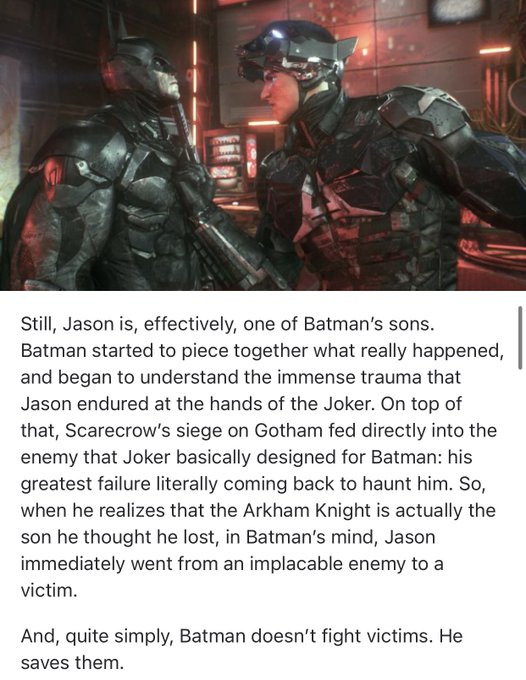
Batman doesn't fight victims. He saves them.
Therefore if Batman is fighting Jason, a victim, he's not acting like Batman. I'm also fine with Arkham Knight being an Under the Red Hood retelling because it's a different story. Comics do this all the time, different universe versions, popular storylines adapted into different mediums. It also works as a commentary on the original story, by showing what Batman could have done to lead to a more positive outcome it makes Batman's choices in Under the Red Hood worse and more tragic because he could have saved Jason, there was still a chance.
So here we have two flawed tragic heroes who are meant to be both pitied and condemned for their actions. One of them is all pity with no condemnation. The other is both pity and condemnation, Batman is grieving, but also he's failing his responsibility towards Jason. Therefore one protagonist works, the other fails utterly.
I'm not saying abusers don't deserve redemption. I'm not saying Enji should have died in order to atone. I'm not saying that the underlying problem with the arc is that they decided to make Enji sympathetic and a focus of the arc. The most important problem is the breaking of one of the fundamental rules of storytelling: Show, Don't Tell.
The Tragic Villain
Not only does The Hellish Todoroki Family plotline fail to make Enji a compelling protagonist, it also fails it's biggest victim. Now, these are both stories that end with the hero failing to save their victim. So if both of these stories have the same ending, why am I saying it failed Dabi, but not Jason?
Well, let me explain.
Dabi and Jason are both villains turned victims. The stories themselves are about this ambiguity. How much should the be held responsible for their own choices? If they are actively harming innocent people, then shouldn't they be stopped? Should they be automatically be forgiven just because of the pain and grief they've suffered, even if they've been causing it to others?
Both characters are also reflective of their fathers because they are too being selfish in their grief, they want their grief acknowledged and so are violently lashing out.
Jason and Dabi both make plays at being vigilantes at first, Dabi wants to inherit Stains will, and Jason Todd wants to be a better bat-man by taking control of the drug trade in Gotham and cutting crime down by executing gang heads. However, neither of them are being honest with this and it's shown through their actions, both of them abandon their original plans.
In the final showdown all Toya cares about is facing Enji on the battlefield, and when he's on the brink of death his mind erodes to the point where all he can do is scream for Enji's attention while his flames get hotter and hotter.
Let's take about Jason first and how his narrative treats him a whole lot better and more sympathetically, with more humanity than Batman. Jason is still held responsible for his choices, he is criticized by Bruce for murdering gang leaders and passing it off as justice. He's also blatantly shown to be a hypocrite. My favorite scene from Red Hood: Lost Days, the official UTRH prequel.
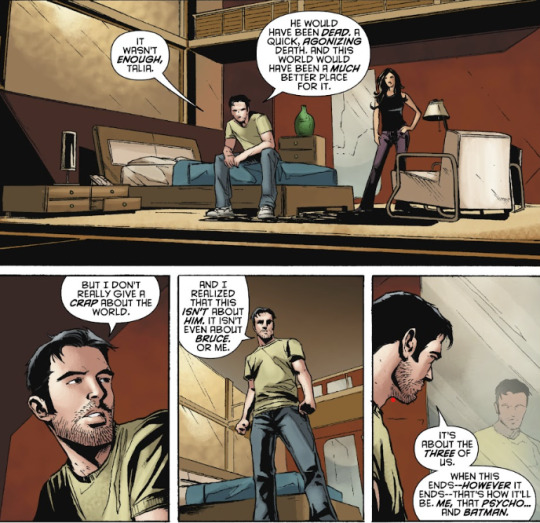
"I want to kill the joker in a cool way. Just sniping the Joker from a rooftop isn't dramatic enough for me."
This scene, and the final scene of UTRH underlines Jason isn't executing criminals because he believes it's the right thing to do, or because of his stated motivation that killing the joker would prevent more future victims.
Instead his every action is to set up a scenario where he makes a selfish demand of Bruce. He wants Bruce to prove to him that he would choose him over being a hero, by setting up his final scenario. Him, the Joker, and Batman. Jason will shoot the Joker. Bruce has a gun. He can either choose to let Jason kill the Joker, or kill Jason to stop him, either way it makes it clear what Bruce's priorities are.
The underlying reason for this is similiar to Bruce. Just like Bruce, Jason is deeply afraid that Batman doesn't love him. That he thinks of him as a failure. (This is Toya's main reason too).
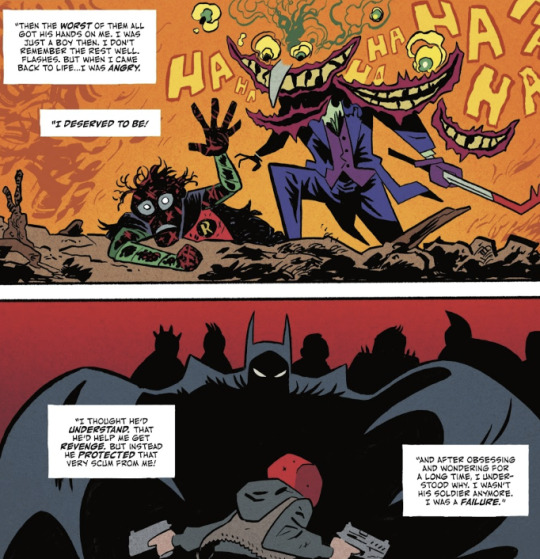
He also interprets Bruce's failure to avenge him to mean that Bruce didn't even care enough to mourn him. If Bruce loved him enough, he'd choose him over the joker, but he's so afraid that Bruce doesn't love him enough that he's going to force Bruce to choose.
Along the way he's also going to behead several crimelords in order to put an exclamation point on that point.
The way Jason completely unravels in the confrontation shows this insecurity, he begins with monologueing about how batman should totally kill people, until his fear that he wasn't important enough, and his grief at losing his father is revealed.
Batman: I know I failed you, but I tried to save you. I'm trying to save you now. Jason: Is that what what you think this is about? Your letting me die. I don't know what clouds your judgement worse, your guilt or your antiquated sense of morality. Bruce, I forgive you for not saving me. Jason: But why on god's green earth is he still alive? Ignoring what he's done in the past. Blindly, stupidly disregarding the whole graveyards he's filled with people. The friend's he's killed. I thought killing me - that I'd be the last person you ever let him hurt. Jason: If it had been you that he beat to a bloody mess. If it had been you he left in agony. If he had taken you from this world. I would have done nothing but search the planet for this pathetic pile of evil, this death worshipping garbage, and sent him off to hell.
Direct statement, it's irresponsible of Bruce to let Joker live after killing Jason and should have put him down to prevent future victims. Reading between the lines, Batman not taking revenge for Jason is a sign that he didn't love him enough, Jason loves Batman more because he would have taken revenge.
As the confrontation continues and Jason's mental spiral worsens, to the point where he can't keep up his pretense of self-righteousness.
Jason: I'm not talking about killing cobblepot, or scarecrow, or riddled, or dent. Jason: I'm talking about him. Just him. And doing it because...he took me away from you.
The father had lost the son, and now the son had lost the father.
Jason's revenge is just a cover, for his grief at losing Bruce. I think this also shows a really positive aspect of Jason's character to humanize him instead of condemning him for his actions to ignore or even justify the suffering he endured: Jason really loves Bruce.
I mean how meaningful is the statement: "Bruce, I forgive you for not saving me."
Bruce has been afraid to hear the whole time that Jason hates him, that he won't forgive him, but Jason loves him deeply. In fact his love is almost equal to his rage because Jason is a deeply emotional person, and these little details make him human and not just like a plot obstacle that Bruce has to face. A metaphor for his past failures.
Dabi is drawn as a crying boy who wants comfort, Jason is shown to be a crying boy who wants comfort through both dialogue and action without us directly needing to be told. It's a heartbreaking line and doing it because he took me away from you and it lands perfectly because the narrative wants us to just look at Jason's grief. It doesn't add an asterisk* even though he was in pain, he's done unforgivable things that can't be justified to undercut Jason's suffering.
In fact that might be another underlying problem with The Hellish Todoroki Family, the narrative tries too hard to make you feel a certain way instead of just presenting things as they are to make you come to your own conclusion. UTRH doesn't support Jason's revenge based serial killing of villains. It doesn't say he's justified to cut off the heads of mobsters. However, it doesn't excessively state "Well, I'm really sorry what happened to you but what you've done can't be forgiven" so we don't have to challenge ourselves to feel too much empathy for Jason's suffering.
Meanwhile even when Toya tries to express his rightful anger and grief, we're always met with someone shutting him down and saying well yeah, but you're wrong, involving innocent people is unforgivable.
As said by @stillness-in-green in the replies to this post:
I think so much harm (in-universe, but the state of the Twitter fandom makes me think the messages are pretty toxic irl, too) comes out of portraying the Heroes as needing to weigh in on the *morality* of the Villains' actions before they gauge "saving" them, when that is not a thing that glorified cops have any business thinking they have the right to do. Demanding repentance before the rehab is so bizarre.
You can say someone's actions are wrong without using it as a factor to consider whether or not their suffering as a human being should be acknowledged, and like I said there's multiple instances of people just yelling at Toya how immoral he is instead of addressing the elephant in the room.
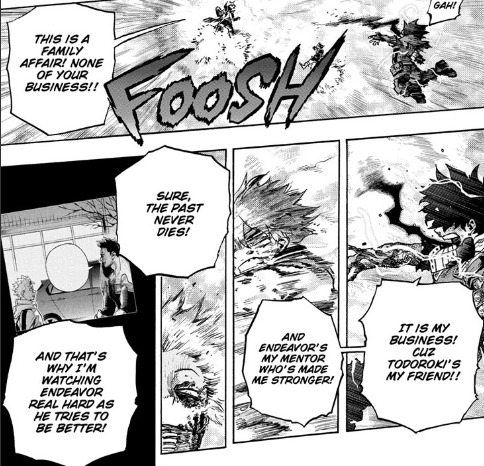
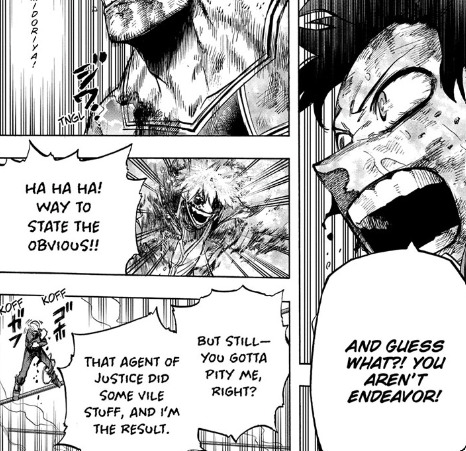
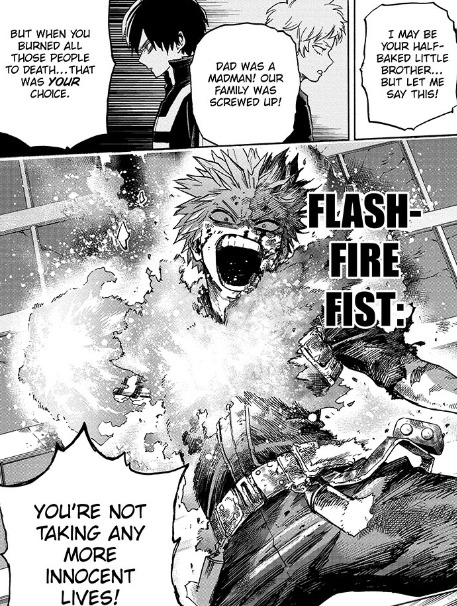
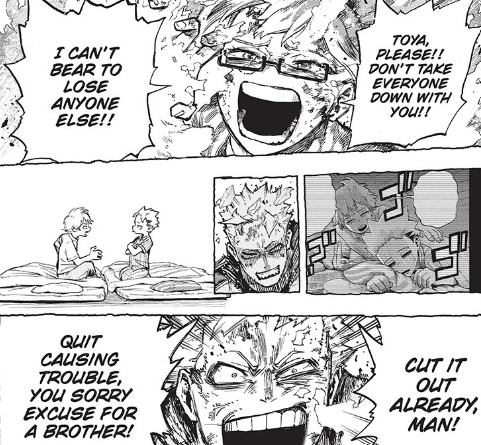
You're wrong, you're wrong, you're wrong, you're wrong.
(Okay, I understand that some people have interpreted this as a show of Honnae and Tatamae, the Todoroki's who are a very repressed household are finally talking about their feelings even if those feelings are selfish and ugly).
(I'm not criticizing Shoto for saying that the people he killed were his own choice necessarily, Shoto is a character who's actions need to be read more deeply than his words he was dedicated to bringing Dabi down without him burning himself any further start to finished. My criticism lies in the fact that Hori uses Shoto as a mouth piece because he thinks we need to be reminded that murder is bad).
However, even acknowledging that time and place man, time and place. They couldn't have done that in the aftermath, when Toya isn't burning to death?
Hey buddy, you're being selfish.
Toya: AHHHHHHHHHHHHHHH I'M MELTING, I'M MELTING.
This is I feel the underlying problem with the way the arc is written, not because the Todorokis are a very traditional Japanese family and there are cultural reasons they express their emotions differently, I'll give a caveat to that it's a nuance I might not understand.
However, I am arguing the actual problem is tell don't show. Horikoshi thinks that we as an audience need to be told multiple times that murder is bad, and we cannot be trusted to interpret that on our own.
Under the Red Hood shows both sides of Batman and Jason's debate, and let's us just come to the conclusion that Jason is in the wrong because revenge isn't justice. Horikoshi reaches no shit sherlock levels of telling us that we're not supposed to approve of Dabi's murders.
it's also a matter of giving Dabi narrative space to express his feelings, like every time Dabi tries to talk he is continually shut down (Shoto does engage Dabi talk to him and listen to why he didn't come back though I'll give him that) and it seems to be to push forward this weird idea that you shouldn't sympathize with the pain Dabi has endured or the ways he's dehumanized unless he does something to prove he deserves to be treated like a human being first.
Jason gets to monologue and make an entire argument, and his argument also shows the depths of his love for Bruce and what a deeply feeling person he is, and how those feelings being hurt and twisted could logically lead to his lashing out.
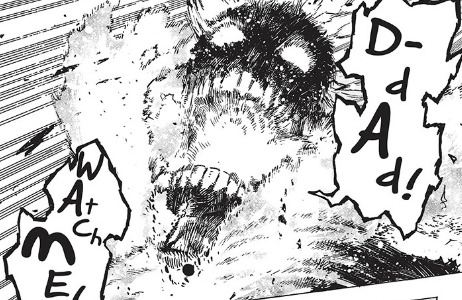
Compare this to Dabi who doesn't get a final monologue, but is instead reduced to a completely mindless state where he just cries out for his dad's attention. He doesn't get to make his argument.
Jason and Dabi both choose to blow themselves up, but Jason gets enough character agency to show this is a deliberate choice he's making even if it's the wrong one. He retains his character agency and ability to make decisions until the end of the narrative.

Jason's also you know physically crying. The end result of the narrative is about wrong choices that both Bruce and Jason make together, and then suffer the consequences together. Bruce watches the same failure play out again and he isn't able to save Jason, Jason doesn't get what he wants, he doesn't get revenge and he doesn't get to reunite with his father. It's tragic for both of them, and brought about by decisions both of them made.
Whereas yes Dabi makes a lot of bad decisions leading up to the last war arc, but in the end his final fate is up to a choice Enji made to not face Toya in the final battle.
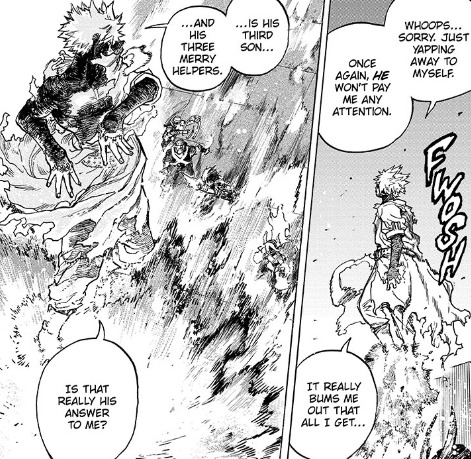
However, while the final consequence of the battle is brought about more by Enji's decisions than Toya's, it's Toya who endures all the suffering and punishment. It's Toya who is in an iron coffin, and doomed to slowly and agonizingly die with all of his skin burnt off unable to move. Toya doesn't even get agency after the arc is over. Enji still has a wheelchair, Enji can still move around, Enji's still fucking rich, he's not in prison for his actions, he as Rei wheeling him around.
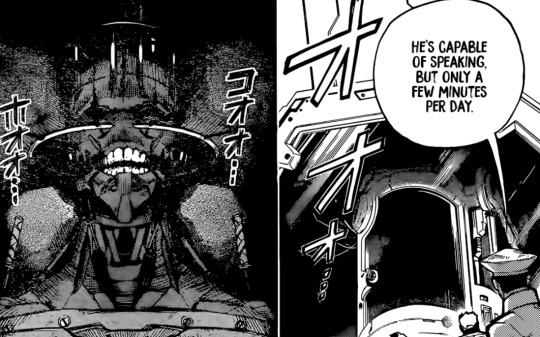
Toya's agency and choices are all taken from him, presumably to serve the plot purpose of making Enji save him to finish off his arc, and then ENJI DOESN'T EVEN SAVE HIM.
Also I think it's important to mention, Bruce's tragic ending is brought about by him attempting to save both, trying to save the joker and Jason with the same action. Whereas Enji's tragic ending is brought about by Enji NOT LIFTING A FUCKING FINGER TO HELP. Yet, it's Dabi who has the lion's share of suffering, and is sentenced to this horrific state of being skinless in an iron coffin and only being able to be awake a few minutes a day with no choice but to waste away.
Bruce is also immediately called out for his actions, by the Joker of all people, you handled this all wrong, it's your fault. Bruce is right to not kill the joker, killing the Joker would not have solved any of Jason's problems, but the fact that he put off facing Jason for so long, and his inability to communicate that he loves Jason is what leads to Jason thinking that the only way to prove Bruce loves him is to force him to choose. It's because Bruce has utterly failed to show him in any other way that he is loved.
Joker: Oh my god, I love it! You manage to find a way to win, and everyone still loses. I'm going to be the one who gets what he wants tonight, badda bing, badda boom."
I'd also like to add that a lot of agency in Enji's actions are taken away too, to make him look more blameless. It's not Enji's fault that he didn't say anything to Dabi during Dabi's dance, he passed out because he had a punctured lung. It's not Enji's fault that he spent a month protecting Deku instead of searching for Toya, he had to protect innocent people. It's not Enji's fault that he didn't go immediately to face Toya in the final war arc Hawks told him not to.
It's not Enji's fault that he made Shoto and Toya fight like Pokemon instead of cleaning up his own mess, and also he feels really sorry for it and as soon as he's done punching the bad guy he'll look after Toya he promises.
Enji does get called out for this behavior but it falls flat because it only comes from the villain AFO, and Toya himself. As I stated above too, the ending is more influenced by Enji's actions not Toya's (because Toya's agency is stripped away until he's mindless) but Toya is the one who has to die while Enji gets to live and atone.
That is the real sticking point for The Hellish Todoroki Family, the way it ends.
Themes Are For Eight Graders
The underlying problem with the whole arc and why The Hellish Todoroki Family fails as a tragedy, is because it wasn't written to be a tragedy.
The above quote is from an interview with the writers of the widely hated Game of Thrones Season 8, which took a sudden tragic turn for Dany's character, gave her an incredibly dehumanizing ending of being put down like a rabid dog by her own lover, an ending that was neither foreshadowed nor did it match with anything written before.
In this meta here by @hamliet it goes far more into depth that Game of Thrones isn't a tragedy, but a piece of Romantic fiction (not a love story, Romanticism is a genre of big emotions, the beauty of life, larger than life ideas hence why it fits well with fantasy genre, it can be sad but it doesn't follow tragic structure).
Dany is a romantic heroine, a deconstruction of the idea of the classic warrior princess trope, and you know a colonizer, but she's not meant to be written as an inherently bad person. There are people who say that Dany was going to die in the original books. I'm one of those people. Me. However, context and framing matters, Dany for all her colonizing ways does genuinely want to do the right thing, so it's likely she'd die a heroic death as a reflection of her selfless intentions (and intentions do matter for fictional characters) whereas in the show she's put down as a villain.
Now watch me I'm going to coin a term for future literary critics to use: Narrative Gaslighting.
Narrative gaslighting is different then Show Don't Tell, where an author has just failed to properly show what they're trying to tell you in the story. Narrative Gaslighting is when a narrative deliberately tries to mislead you, straight up lies to you, or just insists things that did not happen totally happened guys. Much like real gaslighting, Narrative Gaslighting makes you feel stupid for interpreting things a certain way and insists you were wrong all along.
Narrative gaslighting is when Tyrian gives a speech that everyone should have suspected Dany when she burned slavers alive that she was secretly evil and would one day turn on them.
Like, no.
Dany is flawed because she is a foreigner, interfering with the politics of a different country that she does not understand in order to gain enough resources and men to return to her home country and invade that country to exercise her right as a Targeryn to uphold the divine right of kings.
Game of Thrones doesn't mention any of that shit that's in alignment with the previous actions in the story, it's just insisting the very ableist notion that Dany was insane all along and her violence towards other people is the result of her mental illness.
(Also before anyone says, so if she's a colonizer than how can she have good intentions, everyone is Bad in Game of Thrones, they're all waging war to vie for a throne, monarchy is bad guys. IDK how to tell you that Game of Thrones has gray on gray on gray on gray morality).
(Also this aside ties into the hangup of MHA and most popular fandom culture on Twitter, that Dany's moral failings somehow disqualify her from her humanity. In spite of the fact that on top of all of that she's a rape victim, and like, Dany's only on that continent in the first place because she was sold as a bride.)
But here's the same weird subtext that Horikoshi's writing of Dabi. The fact that Dabi was continually victimized and denied human dignity does not need to be addressed, because he did the bad things and didn't atone properly enough for it first.
In essence this random post on the gunnerkrigg court forums I found on the same day the chapter came out, displaying apollo's gift of prophecy.
"When someone is persecuted, it's important to inform everyone about their flaws. That way you don't have to feel anything about all the times that they were denied human dignity."
So, Dany is not written as a tragic hero but a romantic one, we as an audience are both meant to acknowledge her flaws and sympathize with her, not demonize her in an ableist way for being insane, and even if Dany is meant to die the tragic way she dies does not match up with all of the narrative foreshadowing that was built before that.
Like, for instance a lot of POC after the show ended kept telling everyone that Dany's actions in a foreign country were seriously problematic, and not only did the audience not listen but the showwiters didn't acknowledge it with the same subtlety as the books. So those people especially were able to pick up Dany's character flaws, and when the show finally acknowledged them it's not even in the way that critiques of the show were pointing out Dany's flaws it was just "she was insane all along." Not like taking time to go "no matter what the intention, interfering with the politics of a foreign country is wrong."
The problem with the Todoroki arc is essentially the same, down to the ableism (because outsiders continually call Dabi either a maniac or insane Demon without even giving credence to his grievances about hero society he's just reduced to an insane fringe element of society, and Dabi himself is reduced to a completely mindless, childish, insane screaming state where he can't make active decisions).
The Todoroki Arc is not set up to us as a tragic one. The ending is pretty clearly telegraphed to the whole audience. People are not wrong for thinking that Toya's ending would be either rehabilitation like Rei with the eventual hope of being welcomed home, or some kind of house arrest where he still gets to be with his family.
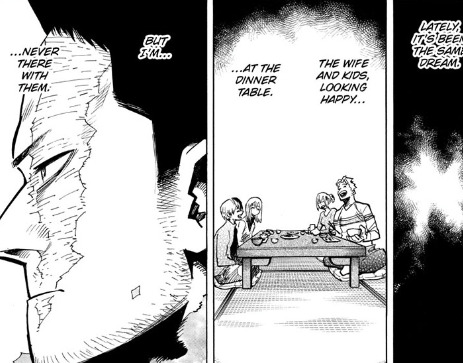
Everyone happy at the Dinner table and Enji not sitting with them.
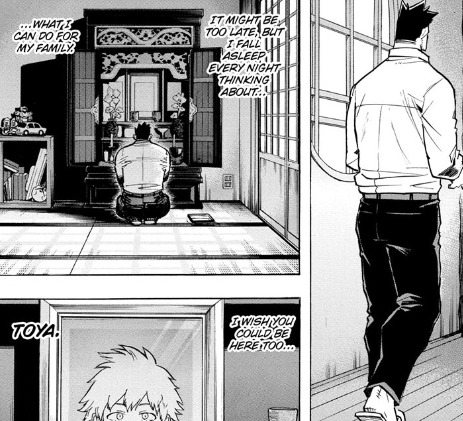
"I wish you could be here, Toya."
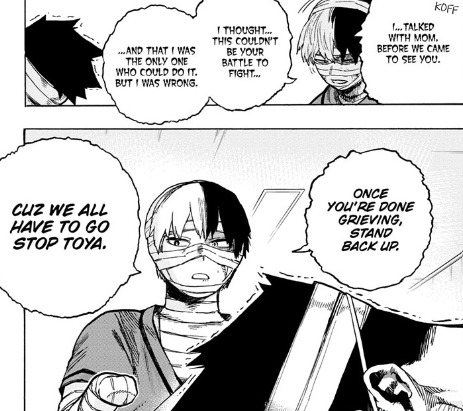
"We all have to go stop, Toya."
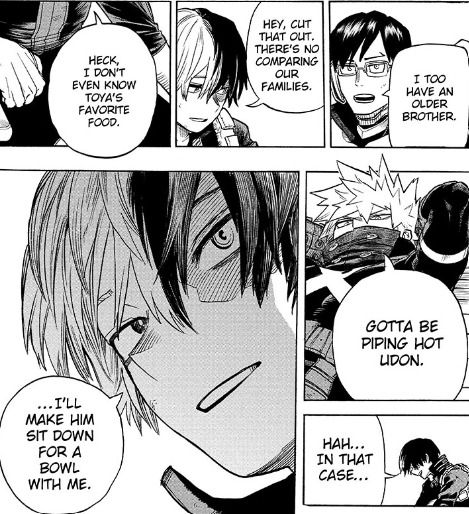
"In that case, I'll make him sit down for a bowl with me."
Even Shoto's efforts to take down Toya non-lethally are rendered completely pointless, because Toya gets back up again and then burns himself alive (completely by his own choice so no one has to feel bad that they failed).
The story sets up the expectation that Toya is going to be brought home and sit down for a meal with his family. Then it makes you feel stupid for going in an entirely different direction. It was always going to end this way didn't you know The Todorokis are a tragedy?
Well, I just spent a very long section of this thesis statement illustrating that if it's supposed to be a tragedy, then it's still not written well.
It's a written as a romantic story of a family healing, and the villain getting saved, only for the villain not to be saved and the story to just keep on going like not getting saved isn't a huge failure. This is something that should permanently destroy the main characters, that they got the chance to repeat Sekoto peak and be there this time and they all utterly failed. I feel bad for Shoto most of all because he did everything right, and he still loses his brother, but does the story show that?
The problem is the story is blatantly lying to you about the fact that Toya was somehow saved, even though he LITERALLY LOOKS LIKE HELLRAISER. To quote Codenamesanzanka again:
But I feel the story couldn't give us that because it will remind the reader and everyone just how much Touya will be missing. In-story, talking any more will overburden Touya's heart - and how apt is that metaphor? So let's talk about how we'll talk, but that's all that's allowed here for this scene. Else we'll see how unfair it is that Touya has to be confined to this room, he isn't with his family and they have to come to this prison just to tell him about their day, and soon he will be gone. Details make it real, and it would've exposed the lie that Touya was saved in an actual way. The story knows it too - "this extra time Shouto gave us." This is all 'extra', and not the core. [...] If the story was sincere that this is a case of "it's simply too late" - as it should be!!! imo, to really drive in the clear point that they failed, they did not get the save they wanted, because that's the truth - the tone of the chapter isn't tragic enough for that. The tone is going for 'Making Peace With This'. We've skipped the stages of grief and all we have is acceptance. The characters have accepted this, and so must the readers as well.
Therefore it's narrative gaslighting, the story is making us doubt our perceptions and trying instead to manipulate us to feel a certain way. We don't have to question the unfairness of Toya's fate, because look at all the people he's hurt, and look how Enji is atoning and taking responsibility.
The story builds up the idea that Enji will choose Toya. That he will choose being a father over being a hero. Enji doesn't do that, and it's Toya who suffers the horrific, painful consequences while Enji gets off mostly scott free. Mind you it's also ableist to suggest that being in a wheelchair is some sort of life-ending consequence like he's fine. The story even goes out of its way to say how avoidable this ending could have been if Enji or Rei or someone lifted a single finger to give Toya the acknowledgement he wanted, and then gives it a "Too little, Too Late" conclusion but doesn't acknowledge that this is where it's ending and instead tells us that Enji has successfully atoned.
"Everyone's watching me. So this is what it's like. If it was such a simple thing, then why not sooner?"
If it was going to turn out this way Toya should have just died here, not because death would somehow be a mercy compared to life in prison, but because the Todoroki Family doesn't deserve to get to pat themselves on the back. If they let Sekoto Peak happen a second time, then they should have to deal with the consequences of that.
It would be consistent is my point. This is written as a "Too Little, Too Late" kind of ending, but we don't get the emotional response from the Todorokis that they've let Toya die a second time.
On the other hand, UTRH has the exact same tragic ending but it doesn't make me angry because it's honest about it. The Todorokis let Sekoto peak happen a second time. Batman let Death in the Family happen a second time, but look at how even the narration and comic panels of the story acknowledge it.
"Fate is a funny thing. It swells up like a raging current and we are forced to travel. It provides us no exit. No deviation. It drops us in a bottomless ocean and compels us. We either swim, or drown, and sometimes as we struggle against the tide, a great truth arises."
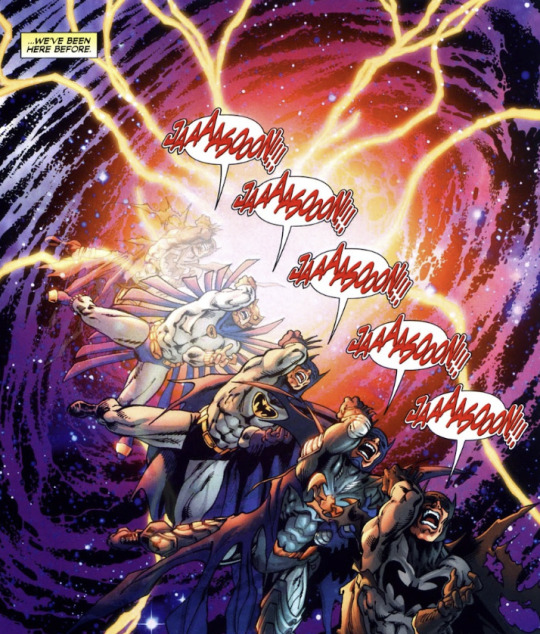
One ends with Enji meaninglessly stating that he'll spend the rest of his life atoning for Toya and watching over him (which I guess will be like two months tops) for the fifth time. The other ends with Batman being lectured by the Joker of all people of how he chose wrong and being forced to watch once again as a warehouse blows up, and he's completely helpless to save Jason.
UTRH ends with the message that Batman sucks, Enji's atonement arc ends with Natsuo calling him cool for atoning and UTRH makes me like Batman way more as a character. Whereas at this point I feel nothing from the Todoroki Family, except for a disgust for the way that Toya not only has to die, but has to die a slow, gruesome death while the rest of his family walks away with the small comfort of "oh at least we'll get to say what we need to say before Toya passes."
Especially with the fact that Toya's greatest fear was that when he died, he died meaninglessly because his family never grieved him and all moved on with their life. I guess we don't have to analyze how gross the underlying message that criminals don't deserve to be sympathized with because themes are for eighth graders.
EPILOGUE
The post is finished but apparently everyone expects me to cover every single possible angle even in posts this long.
You didn't address the cultural aspect. Under the Red Hood is a western story, and Todoroki Family is based on eastern concepts.
The post isn't about that. The post is long enough I can't cover every single topic. Here's someone who covered that topic thoroughly. This one discusses more about the nuances of collectivism.
Also, since the Todoroki Family obviously copied Under the Red Hood's homework, it warrants a comparison. Especially since it seems to critically misunderstand what made the original work.
Which is a valid form of Literary Criticism, as Ursula K Le Guinn once said:
It doesn’t occur to the novice that a genre is a genre because it has a field and focus of its own; its appropriate and particular tools, rules, and techniques for handling the material; its traditions; and its experienced, appreciative readers—that it is, in fact, a literature. Ignoring all this, our novice is just about to reinvent the wheel, the space ship, the space alien, and the mad scientist, with cries of innocent wonder. The cries will not be echoed by the readers. Readers familiar with that genre have met the space ship, the alien, and the mad scientist before. They know more about them than the writer does.
The Todorkis aren't all to blame for Toya. Natsu, Fuyumi and Shoto are innocent:
You're right. It's just easier to refer them as the Todorokis then specifying "Enji and Rei" each time.
You didn't mention Shoto once in this post:
I have no cricism for Shoto's role in all this. In fact I think he's the best written part. I praise it here.
Shoto is a good boy, and he deserved to spend more time with his brother. The fact he won't be able to sit down and have dinner of him, is the greatest tragedy of them all.
#mha meta#mha spoilers#mha 426#mha 426 spoilers#shoto todoroki#dabi#toya todoroki#enji todoroki#under the red hood#jason todd#bruce wayne#batman#mha critical#todoroki family
588 notes
·
View notes
Text
TW: ABUSE, CHILD ABUSE
“He wants to air this dirty laundry to the world does he…? Dabi, you fiend…you’ve been waiting for this moment…when they couldn’t prevent mass destruction…and faith in heroes is wavering.” - chapter 292
I truly, wholeheartedly, believe that MHA as a story upholds the myth of the perfect victim. I do not want to discuss if Horikoshi did that on purpose, or subconsciously because of inner bias – I find no meaning in doing so. For me the execution of an idea, in the grand scheme of the narrative, holds more value than the intention of the author. I’ve also had my fair share of people infantilizing Asian authors in the anime community for their poor writing decisions for one lifetime. It’s patronizing to both the author and the people reading it. Whether or not Horikoshi intended for his themes of abuse to paint the picture they did does not matter, because that’s how it reads as.
MHA puts victims of abuse in narrow boxes and softly dictates what’s an acceptable reaction to said abuse. Victims are continuously walking a tightrope between being deserving of compassion and sympathy and being unredeemable monsters who are too far gone and are only good for martyrdom after being put down.
Eri fits the clean cut depiction of abuse victims that media usually gears towards. She is untouched by the cruelty around her - she preserves her innocence and kindness. She isn't assertive, but rather meek and passive. She doesn't fight back with force. And when offered help, she is receptive to it. That is not to say that Eri's depiction doesn't have a place in fiction, or that her portrayal can't be representative of the experiences of some - as we all deal with trauma and the inhumanity people throw at us differently. We see the same thing in the portrayal of Fuyumi, who shares many of the qualities discussed above. The same thing applies to her - i personally love the idea of all the siblings having different reaction to their childhood trauma and abuse. It shows that victims are not some type of monolith.
But the narrative treats the "forgiving" or "receptive to help/support" victims of abuse with more grace and with much more kindness. if you are willing to forgive, or the very least be quietly tolerant, the story grants you a happy ending. Forgiveness isn't a bad thing, it is an individual choice - but an abuse victim shouldn't have to do it for them to have a happy ending.
In a vacuum Eri and Fuyumi's character arcs and depictions of abuse are good but it becomes a problem when that's the only experience and type of victim we ever hold in high value or recognize as valid and deserving of compassion. Which the story reinforces.
Touya and Tenko's backstories aren't pretty nor comfortable or easy to sit through. Their responses to abuse aren't either. Reactive abuse is very much real.
#tw abuse mention#tw trauma#tw child abuse#this is unfinished#i just don't have enough time to expand upon it cause of uni#maybe some day i will reread mha and revisit this#posting it cause it has been sitting in my drafts for a while#other thoughts are very much welcomed :)#mha critical#bnha critical#my hero academia#mha analysis#anti mha#league of villains#anti endeavor#anti enji todoroki#media analysis#anti best jeanist#i hate him#he stinks up the place#i cant tag all the characters in mha that ignore abuse in mha#unfortunately#calling abuse dirty laundry is very bad very stinky#touya todoroki#tomura shigaraki#mha dabi#discussion#personal essay#essay writing
323 notes
·
View notes
Text

Can't believe Toga became the exact martyr that Curious was going to turn her into.


#like at least they are changing things#thats not a bad thing#but toga should have been part of that reformation#mha 430#bnha 430#mha spoilers#bnha spoilers#mha critical#bnha critical
471 notes
·
View notes
Text
How appropriate.


#bnha critical#mha critical#anti bakugo katsuki#anti bakugou#anti katsuki bakugou#anti bkdk#anti bakudeku
381 notes
·
View notes
Text
Hmmmm very interesting. So you’re saying that despite Bakugou’s immense strength and talent, he still ended up lower on the hero rankings as the 15th best because of his abrasive personality being difficult to work with. Almost as if being likeable is an important part of being a hero and can’t be neglected even if you’re powerful. Damn…if only that little tidbit of characterization wasn’t dismissed with a throwaway joke and was actually used as a stepping stone to character development.

#It’s funny but at the same time I can’t help but AAAAAAAUUUUUUGHHHHH#It’s not that that particular issue is never touched upon considering that Best Jeanist literally has a bit about making Bakugou less scary#during the internship. However the fact that his terrible attitude was seemingly never corrected after the fact (and persisted in his#professional career to the point where he is way lower on the rankings than anyone thought he would be is…)#I love the jokes and all but man…COME ON NOW#ENOUGH WITH THE SLAPSTICK YELLING AND CARNAGE#mha critical#my hero academia#mha 431#bnha 431#boku no hero academia#bakugou critical#bakugou katsuki#anime
192 notes
·
View notes
Note
The issue with Momo is that she's pigeonholed into a really stupid fighting style to begin with. Hero/villain fights in MHA are just duels basically like when two rams butt heads with each other in an unga bunga game of one upmanship and hitting your opponent progressively harder. Her quirk is trying to fit a square peg into a round hole.
Using her quirk in the middle of a fight to create a counter to that specific foe is pointless when the true measure of her power is prep time. It's the worst way to use her power.
She could, with the aid of some scientists, create things greater than the mech suit Izuku and All Might use. The costs are utterly irrelevant because she can prototype anything. Who cares if it costs billions to make a weapon or a device when she spends NOTHING to create anything. The author even stated that it's possible for her to make food with her quirk, just that it wouldn't taste very good unless she understands the structure of flavors and whatnot. So she basically has no limits besides the bottleneck of picturing what she needs to make in the middle of a fight. Which is eliminated if she prepares her gear in advance.
She can invent materials that do not exist in nature but she understands the molecular structure of. Super durable metals that weigh very little. Composites of various materials that would require intense machining to put together or are impossible entirely with our current understanding of science. This is the benefit of her being a rich girl and being able to pay other people to think for her. Or better yet, she could offload all of her thinking to Mei Hatsume, who would handle the research and simply print out everything that Momo needs. Mei violates reality on a daily basis. What's she going to do with unlimited materials and someone who doesn't care if she breaks things, just that she gets results? Imagine a fleet of AI controlled Iron Might suits that Momo directs and controls from an APC she created and is hiding in at a remote location.
The tools already exist within canon for these pieces: UA robots have AI. There would have to be schematics for every piece of the super suit. Her counters would involve watching the progress of a battle and then creating a new robot to go attack her enemy while she hides at a distance. Also, because she can create anything as long as it's not alive, she could rapid fire generate vaccines if taught how to make them by qualified experts, given that many vaccines are dead samples of a virus anyways. She has objectively one of the best abilities in the entire series, in the same tier of abilities like Overhaul and a fully realized Poltergeist.
Yeah, I agree. Momo would be terrifying if she had time to prepare - she'd be a mini-Nedzu in that sense.
The fights in MHA are very lackluster. Yeah, they're flashy and sometimes there's creativity in it, like Ochako's plan to take down Bakugou, but 90% of them are just 'punch harder' and 'hit faster'.
I mean, All Might versus All for One had the stupidest final moves. All for One has this collection of quirks, and yet he choses to... make bigger fist. Punch with bigger fist. And All Might just punches him really hard.
Horikoshi made a villain who could pull anything out of his arse, and we'd just figure that he stole it beforehand, but his 'ultimate move' is just big fist? Come on!
Using her quirk in the middle of a fight to create a counter to that specific foe is pointless when the true measure of her power is prep time. It's the worst way to use her power.
I will have to disagree. It's far from pointless, because you can't predit every fight you're in. Nighteye had foresight and he couldn't do that. All for One couldn't do that. Nedzu couldn't do that. Nobody can do that.
Information is hard to gain, and you can't prep without knowing what you're up against.
If she focuses all her effort on planned-for fights, she'll be sorely unprepared if someone attacks her before she knows about it. If they jump her randomly, or she can't gain a single drop of information about her opponents.
Yes, she'd be incredibly behind the scenes, creating everything she could theoretically need for a fight she's prepared for. She'd be great as a support hero, even.
But, let me ask you a question: what if she can't prepare?
...
Yeah. if she doesn't know what's coming, she can't prepare, and that makes your argument, that her adapting mid-battle is pointless, moot. She has to be strong in both of these aspects.
Preparing before a fight or a raid, and adapting mid-battle.
Again, Momo is only really limited by Horikoshi's creativity.
I was actually discussing the potential of her quirk with a friend of mine, and we both agreed that she was easily one of the most powerful and versatile characters, and Horikoshi didn't do her justice.
There were a lot of things discussed. Grenades, molotovs, pipe bombs, for one. Small things that do a lot of damage. We also thought about poison and poison gas, though she wouldn't use anything deadly.
Let's pair her up against 1-A students, shall we?
Vs Aoyama: Make a mirror, maybe even a highly reflective suit of armour, and he's done. Or a gun.
Vs Ashido: Water balloons of pH 13-14, and her acid is neutralised. Or a gun.
Vs Asui: Flamethrower. Or a gun. Anything long-range or heat-based to make her dry out.
Vs Bakugou: Throw gunpowder at him and let him blow himself up. Or liquid nitrogren to make him freezing cold. Or a gun.
Vs Hagakure: Going by plain ivisibility, Momo can make thermal goggles and find her.
Vs Iida: Lube up the ground and watch him spin into oblivion.
Vs Jirou: A wall of rock wool, and her sound waves are redundant. Or a gun.
Vs Kaminari: Copper poles to attract lightning away from her, or a mirror again. Or a gun.
Vs Kirishima: Bombs. Of any kind. Whittle away at his defence at a long-range.
Vs Kouda: Surround him in rock wool or make a speaker to drown his voice out. Or a gun.
Vs Midoriya: I'd say a gun, but he can dodge them... Fuck it - acid. Use acid.
Vs Mineta: A gun.
Vs Ojirou: A gun.
Vs Satou: A gun.
Vs Sero: A gun.
Vs Shouji: A gun. Failing that, use a molotov.
Vs Todoroki: Flame retardant for his fire. For ice, just dodge until he gets hypothermia.
Vs Tokoyami: Flashbombs or a flamethrower.
Vs Uraraka: A gun.
... Yeah, a lot of people are weak to guns.
#ask#mha#bnha#boku no hero academia#my hero academia#mha critical#bnha critical#kinda#horikoshi critical#yaoyorozu momo#momo yaoyorozu
20 notes
·
View notes
Text
I 'liked' Endeavor's character when he was supposed to be hated, toxic family members are everywhere and I thought this was a sign the series was going to call guys like him out, people who use tradition to enable/ justify abuse. Instead, it became dedicated to kissing his ass. There's also zero self-awareness in this and how pathetic that manchild is
One question I'm still trying to figure out is how the fuck does he change?
He's still throwing himself a pity party, but because he can no longer whine about the number one spot (which is literally common knowledge to be more about image than action, and Endeavor has never put any effort into that), it's now "oh no I ruined my relationship with my family with my constant abuse and neglect, did I mention one of my kids literally died a decade ago, from this,"
Now only focusing on what he does after this realization, how does he try to fix this? He doesn't spend time with the one kid (Fuyumi) who for some fucking reason wants a relationship with him. Instead, he harasses her into giving him his masterpiece's phone number. Which he then uses to call him in the middle of class, this was in regular school hours, not some bonus class or club, literally standard school hours. His employees are seen wondering what he is doing calling Shoto in the middle of class.
He openly admits he only offered the work study to Shoto's friends so he would come (so manipulating his son), and that he's only going to focus on that kid. Him understanding Deku's word vomit isn't Endeavor being smart, it's Deku being shit at explaining anything, and someone barely managing to get it.
Oh and he totally respects Natsuo's feelings when he freezes when his middle child is in immediate danger due to their relation, only to immediately hug him after dumping that excuse on him, with zero consent from Natsuo. So life in danger, consent & feelings suddenly matter to him, life not in danger anymore, but still in a highly traumatic moment, consent & feelings no longer mean shit, way to go Endeavor 10/10
Endeavor is also 45-46 Dabi is 23-24. 45-23= Endeavor was 22 when Touya was born. Reminder he sought out the Himura's after he gave up at beating All Might, Touya's fire didn't inspire him, he didn't get the idea after marrying Rei, this successor plan came first. Pregnancy takes an average of 40 weeks (you can even cut a bit to make Touya a premie), even if Endeavor somehow managed to find an ice quirk based family the day he gave up on beating All Might, married Rei, and got her pregnant all in the same day (like a fucking sim), that would still mean he gave up at 21! This man gave up at 21, at the latest! How is that anything but pathetic!
He shouldn't be a role model he should be mocked.
211 notes
·
View notes
Text
Okay, but like, mha was a story that preached about hope over and over throughout the story. The setup was there from the beginning. We got up close and personal with the villains and got to empathize with them.
The main character literally states that the power of OFA is a power to save people, not to kill, so yeah, it was insane that Horikoshi concluded Izuku and Shigaraki's fight like that after years of build-up. Especially since Nana Shimura was deeply connected to their plotline, and she even said herself that saving somebody meant saving their life and their smile on their face.
Next up was Ochako and Himiko. My disappointment is immeasurable that Horikoshi went through with killing Himiko off as she's literally a child. She had so much life left, so much time to turn a new leaf around. Out of the 3, I always thought Toga was the least likely to die. I'm not going to search for the panel right now, but back when Ochako did her whole speech with megaphone and she talked about a bright future and smiling together and how Toga's safe flashed in her mind there..I mean I thought that was some hopeful foreshadowing that Toga could have a happy future one that included smiling. 😀 but nope.
Lastly, Touya and Shouto, actually, I won't get into it here.
I'll save that for another post, but I will say it's depressing that there were so many hints foreshadowing the todoroki family being whole again and it felt like the story was heading in a path of restoration.
But honestly, I don't think My Hero Academia works as a tragedy. If you're setting up a story to become a tragedy, you don't do it on accident. You set it up from the beginning with the tone and themes. That's why mha falls completely flat in becoming a tragedy for the villains in the last 5 chapters after years of the story having hopeful themes of second chances and redemption.
Mha doesn't work as a tragedy.
246 notes
·
View notes
Text
My Hero Academia spent its 10 year run concerned with the power of reaching out to others, but in the end, how powerful was it? Reaching out was not a miracle, it was not enough to save the people the climax concerned itself with. Even if it helped some characters along the way, at the peak of the narrative, it couldn’t do the job. What can reaching out do? Not a lot, says My Hero Academia, but maybe it can help in small ways. And isn’t that just anti-climatic. Of course the story feels unsatisfying; the thesis of the manga wasn’t even enough at the end.
Reaching out could have meant so much if Deku reflected on the power of extending your hand as Shimura Tenko stood beside him, alive and saved by that help. He could have continued a cycle of reaching out by continuing to be a hero to villains, coming to them with empathy and reaching out his own hand, finally able to save and heal instead of kill and destroy.
Instead, we learn that it might be enough, so long as it isn’t too late. It’s not just about the villains dying, it’s about the core of the story falling completely flat.
313 notes
·
View notes
Text
Weird how the class could barely ever see each other when Midoriya was just a teacher, but as soon as he gets this suit and can be a hero again, all twenty-one of them are all conveniently in the same place to answer a single call about a road being blocked by a landslide.
Just saying... eight years.
242 notes
·
View notes